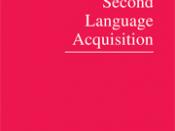As English becomes more and more of an international language with the establishment of local varieties in different countries, bilingualism and multilingualism has an emergent social and cultural role in children being increasingly expected to master the art of having to speak and converse in more than one language.
In this essay, I will begin by discussing how Julian Roux has acquired two languages under the cultural influence of his mother and how Helen, a monolingual child, speaks another variety of English so as to foster a social identity. Next, I will share how social and cultural contexts may influence children's choice of language, their code switching ability and their ability to make stylistic variation of their speech through three case studies. Then, I will discuss how children acquire language in a monolingual and bilingual environment. Lastly, I will look at how some cultural attitude influence children's acquisition and use of language.
First, let's examine Julian Roux's conversation with his mother. Being brought up in an Afrikaans-speaking home and learning English as a second language, Julian is an example of a bilingual child speaking a variety of English, in which in this case, South African English
Through Child's Dictated Speech (CDS), Julian's mother used a higher pitch, exaggerated intonation and slower delivery rate to develop his speech. Julian's pronunciation carried a South African accent, modeled after his mother. This can be observed from his pronunciation of words such as 'yes', 'tractor' and 'milk', which contain vowel sounds that are distinctive of the South African language, Julian's native language. Julian's choice of words is also influenced by his first language. The word "horsey", rather than "horse" is being used.
In terms of syntax, there appears to be several over-generalization in some plural nouns such as 'sheeps', 'grasses', and 'hays' in his...



Interesting
I didn't think that a reader could be as insightful asthe author was. When I read the essay it related to me. It is excellent.
0 out of 1 people found this comment useful.